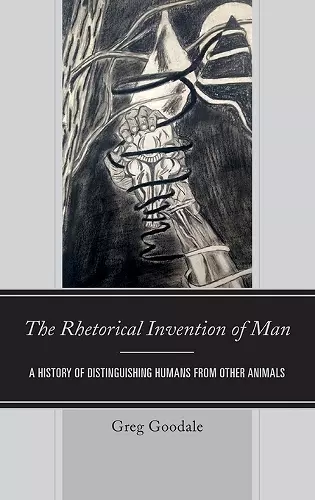The Rhetorical Invention of Man
A History of Distinguishing Humans from Other Animals
Format:Hardback
Publisher:Bloomsbury Publishing PLC
Published:9th Jun '15
Currently unavailable, and unfortunately no date known when it will be back

This book draws attention to the logical contradictions, unstable premises, and unquestioned assumptions that underlie arguments about Man’s distinction, while also demonstrating that the way we think about nonhuman animals is only one possibility among many. Vestiges of older ways of thinking continue to inform our understanding of the human-nonhuman animal relationship, disturbing the simple narrative that Man has mastered nature. The reader will additionally find here a history that illuminates popular attitudes toward nature as well as intellectual traditions about the relationship between Man and other animals. As a result, each chapter is an overview of how the past continues to inform the present. The chapters, then, move back and forth between ancient ideas like the myths of Prometheus and Orpheus, Age of Reason philosophers like Francis Bacon and Immanuel Kant and modern practices like petkeeping and vivisection.
In this stimulating book, Greg Goodale pursues a campaign against a centuries-old and persistent rhetorical construct, “Man.”.... Goodale has tackled a fascinating subject in interesting and productively offbeat ways. * Isis *
Goodale demonstrates that the interdisciplinary field of animal studies is a fit and fascinating companion for rhetorical studies…. Grammarians, classicists, and historians of rhetoric will find themselves taking a new look at familiar territory when Goodale leads them on a tour of canonical texts, examining translations of pronouns referencing human and nonhuman agents and strategic uses of passive voice. Historians and philosophers of science will be drawn to his history of science as an epistemology shaped by the logic of distinctions, and animal studies scholars from the humanities will appreciate his careful and convincing deconstruction of anthropocentric reasoning about Man’s place in the natural order. Potentially the book’s most valuable contribution, however, is to environmental ethics…. Because its argument so clearly illuminates the limitations and distortions of human rationality that have brought us to the so-called Anthropocene, this book is relevant to readers far beyond rhetorical studies. * Rhetoric & Public Affairs *
Greg Goodale’s new book contributes to a growing interest in distinctions and identities between the human and the animal in communication theory. He addresses questions of what it is to communicate and to be human in interesting and forward-thinking ways. This volume should appeal to a wide variety of scholars in communication and rhetorical studies. -- Barry Brummett, University of Texas-Austin
In this pathbreaking book, Greg Goodale takes us on a fascinating tour of the many ways in which humans, since the "Age of Reason" have attempted to distinguish ourselves from nature, and in particular from other animals. Digging through medieval archives in search of a different way of understanding the world, Goodale discovers that the concept of "Man" is an invention that has only existed for a few centuries and is likely to soon be replaced by a more enlightened way of understanding the world. -- Aysha Akhtar, author of Animals and Public Health: Why Treating Animals Better is Critical to Human Welfare
ISBN: 9781498509305
Dimensions: 237mm x 161mm x 19mm
Weight: 413g
192 pages